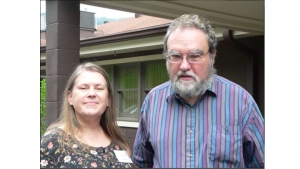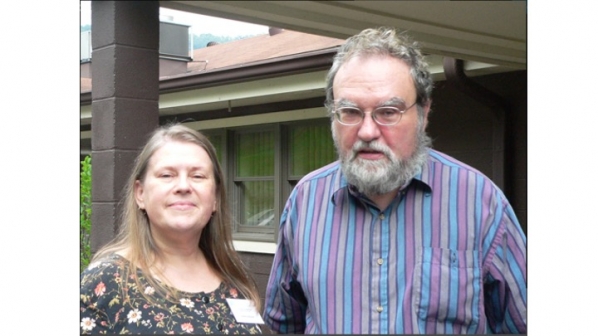Dr. Ballard’s OSCA (Off Campus Scholarly Assignment) report is on her favorite American writer Harriette Simpson Arnow. Dr. Ballard has been studying and researching this writer for a very long time and working on a biography about her. In creating this biography, she also came into contact with the author’s son, Thomas Arnow, and has enjoyed reading and responding to his 300+page memoir-in-progress.
Harriette Arnow is not as well known as she should be, but she has done something other writers have not, which is to focus on the migration of people in the Southern Appalachian mountains to urban centers during WWII. In her novels, she recorded the experiences of American people who stayed home during WWII. Dr. Ballard, along with some critics, sees Harriette Arnow’s first three novels as a trilogy, showing the progress from paths to gravel roads to highways, and how “progress” operates in taking people in and out of the mountains.
Arnow grew up in Kentucky and moved to Michigan. She lived during the Great Depression and kept nearly everything she ever had. Even though she moved to Michigan, she wrote about Kentucky in one way or another throughout her life. She grew up in a family where her mother and father were teachers. She did not want to be a teacher but became a teacher for a while. She wanted the time to focus on her writing and knew from a young age that she wanted to be a writer. So after being a teacher for a while, she told her parents that, “I would rather starve as a writer than starve as a teacher.” She started writing short stories first and then published her first novel Mountain Path, the second Hunter’s Horn, and the third The Dollmaker. Originally, she had different titles for her novels: she wanted Mountain Path to be Path, Hunter’s Horn as End of the Gravel, and The Dollmaker as The Highway. Arnow saw many things happening to Appalachian people and mountains and recorded their experiences.
Dr. Ballard and Thomas Arnow went to some of the same writing conferences, and it was there that she got to know and talk to Thomas Arnow about his mother. Thomas is an engineer who can also write, and Dr. Ballard jokingly told him that, “it would be helpful to your mother’s biographer if her son wrote a memoir.” Thomas agreed to begin and has worked for several years on a memoir. He has given presentations of it at a writing conference that solely focuses on Harriette Arnow.
Dr. Ballard had intended to make a trip to Lexington, Kentucky where Harriette Arnow’s archives are kept in the Margaret King Library’s Special Collections at the University of Kentucky. Unfortunately, the COVID-19 pandemic prevented her from traveling. The Appalachian Studies Association Conference that was set in Kentucky was also canceled. Fortunately, an extensive catalogue of Arnow’s archives is available online, and she used part of her OCSA to review where she was currently on the biography and what remains to be done.
I asked Dr. Ballard if she knew how long the biography of Harriette Simpson Arnow will be. She laughed, smiled, and had a simple answer “no.” So far the biography has hundreds of pages and she continues to work and edit it as she finds new works. Dr. Ballard reads everything that Arnow has created from published works to unpublished manuscripts and letters. Her passion and admiration for Harriette is endless, and she said,
“It surprises me sometimes that I continue to be fascinated by this writer.”
Credits: Written by Jason Xiong, photo supplied by Dr. Sandra Ballard.

